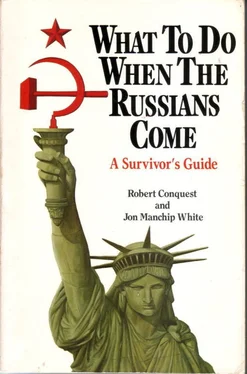Robert Conquest - What to Do When the Russians Come
Здесь есть возможность читать онлайн «Robert Conquest - What to Do When the Russians Come» весь текст электронной книги совершенно бесплатно (целиком полную версию без сокращений). В некоторых случаях можно слушать аудио, скачать через торрент в формате fb2 и присутствует краткое содержание. Город: New York, Год выпуска: 1984, ISBN: 1984, Издательство: Stein and Day Inc., Жанр: Публицистика, на английском языке. Описание произведения, (предисловие) а так же отзывы посетителей доступны на портале библиотеки ЛибКат.
- Название:What to Do When the Russians Come
- Автор:
- Издательство:Stein and Day Inc.
- Жанр:
- Год:1984
- Город:New York
- ISBN:0-8128-2985-9
- Рейтинг книги:3 / 5. Голосов: 1
-
Избранное:Добавить в избранное
- Отзывы:
-
Ваша оценка:
- 60
- 1
- 2
- 3
- 4
- 5
What to Do When the Russians Come: краткое содержание, описание и аннотация
Предлагаем к чтению аннотацию, описание, краткое содержание или предисловие (зависит от того, что написал сам автор книги «What to Do When the Russians Come»). Если вы не нашли необходимую информацию о книге — напишите в комментариях, мы постараемся отыскать её.
What to Do When the Russians Come — читать онлайн бесплатно полную книгу (весь текст) целиком
Ниже представлен текст книги, разбитый по страницам. Система сохранения места последней прочитанной страницы, позволяет с удобством читать онлайн бесплатно книгу «What to Do When the Russians Come», без необходимости каждый раз заново искать на чём Вы остановились. Поставьте закладку, и сможете в любой момент перейти на страницу, на которой закончили чтение.
Интервал:
Закладка:
You might also think of having a radio capable of receiving stations overseas, which may give you better information about what is going on in the United States than you will be able to obtain from official broadcasts. In listening to these, you should also take the customary precautions of keeping the volume low and not having anyone present of whose reliability you are not certain.
There will be times of comparative relaxation as well as ones of intense horror. In these milder times, you still should not talk too freely. Remember that there is a file on you at the local secret police headquarters, and when things get worse again, you may suffer. As a Soviet writer rightly remarked to the American academic Dr. Gene Sosin when congratulated that things were a little easier: “Yes, but what about yesterday—and tomorrow?”
You may have complained, in your time, of the spread of bureaucracy in present-day America. When you come to look back upon it, you will be astonished at its moderation in comparison with what you will now experience. The number of forms to be filled in will increase tenfold. The number of permits, identity cards, labor books, ration cards, and registrations will astonish you. State offices will multiply, and the number of their employees will proliferate. But more importantly, from your point of view, is the fact that you will be entirely at the mercy of the new functionaries. There will be no press, independent lawyer, or politician, nor any other effective means of combating errors, injustices, and bullying. Courtesy toward the citizen will disappear. You will feel that you are mere bureau fodder. But be prepared for it. Get used to it. Study the new forms carefully. Do not be too alarmed if some document goes astray—very few people will be able to keep up fully with all the demands. On the other hand, if you are cheerful and helpful to your local administrators, who after all are subject to harassment in their turn, you may find them helpful when you want, for example, to visit a coastal state at short notice and thereby be able to get your permits in a week or ten days instead of having to wait months.
Inside every office the tension will be high. Those seeking promotion, or mere survival in their jobs, will increasingly tend to use every form of intimidation and blackmail against anyone they believe is a threat to them, including denunciation on charges of anti-Soviet agitation, which will lead to swift arrest. We can only advise you to keep a low profile and to control your natural instinct to express your own feelings and opinions. You will be able to console yourself by the frequent disappearance into labor camps of those who gained promotions only to find themselves denounced by even more devoted toadies of the regime.
Though the government apparatus will undergo a great expansion, all the key posts will be taken over by trusted supporters of the Soviets. However, there will be a transition period when the number of people with suitable training will be inadequate, and for a time, numbers of old civil servants will keep their jobs, although many will be purged, and those judged least politically reliable will be demoted or passed over for promotion. In the economic departments all who hold non-Marxist economic ideas will be removed. Salaries at the senior level will be high, with many perquisites such as cars, apartments, and so on; but the lower grades will suffer a sharp decline in real income. Moreover, although many buildings that have been abandoned by or seized from business firms will have been taken over, the expansion will be too great to cope with except by an increase in the numbers of people sharing an office. This should rise to between three and four times as many as now. Privacy is always one of the rarest commodities in a Communist dispensation. There will be a corresponding deterioration in office equipment. Nevertheless, government employ will be the only alternative for many persons who previously owned their own store or business concern or who were employed in one of the now-extinct enterprises.
There is something to be said, in fact, for seeking a job in one of the main offices dealing with the controls, permissions, and documentation now demanded on an ever-increasing scale. In such surroundings, it is easier to remain anonymous and to draw the minimum of attention to oneself—always an important consideration. On the other hand, a post in a small town, where there might be more opportunities for establishing relationships with those involved in the supplies of food and other necessities, has its points; moreover, it will always be advantageous to live where you do not need transport other than a bicycle to get to work. In the cities, where your home may be far from your job, the absence of private cars and the enormous overcrowding and erratic nature of public transport will make your morning and evening commuting a daily nightmare.
One problem that will particularly trouble you, especially during the initial period of disorganization, will be crime. Looters and muggers will have a field day. Because of the presence of the militia and the army patrols, you will not dare to carry anything that during a search might be construed as a weapon; but you and your family ought to make yourselves acquainted with at least the basic rules of unarmed combat in order to be able to defend yourselves against an attack by someone wielding a club, knife, or blackjack. In a fairly short time, however, the situation will ease. Muggers will disappear from the principal thoroughfares, and looters will be shot on the spot. The police will have full authority to fire on suspects however young, and there will be no public or other enquiries afterward.
However, once the immediate postoccupation crime wave has been put down, the authorities will cease to take much notice of nonpolitical crime. Occasional big round-ups of all known criminals will put down particularly overt waves of crime, and those caught will be shipped off to labor camps to serve, as we have seen, as sub-bosses over the much more numerous “politicals.”
But the police will be very busy, not only in all the many aspects of watching the citizens’ loyalties, but also in a wide variety of administrative tasks such as issuing “internal passports.” stamping them, registering all visitors to the particular town, issuing licenses for every sort of activity, and so on.
Soon a new criminal element will spring up. Many will be teenagers. Within a year or two America will have a well-developed caste of “hooligans.” Some will be the veteran survivors of present teenage gangs who have neither been shot nor been incorporated into the “militia” of the new order. Many will be children and young adolescents, thrown into the streets upon the death or arrest of their parents, who will roam the towns and the countryside and commit savage crimes. As for the young thugs who have been taken on by the regime, you may even recognize them, if only from old newspaper photographs, as you see them in uniform, accosting and arresting you, and asking bribes for your release. Experience shows, moreover, that many such criminals become well adjusted to their work and are soon indistinguishable from their more ideological comrades. Several common criminals rose high in Soviet and Eastern European police organizations; one, E. G. Evdokimov, even becoming a member of the Party’s Central Committee.
Organized crime in the form of the Mafia will be put down firmly; although any important member of the Mafia who shows any political sophistication ought to find it possible to arrange to be recruited into the regime’s administrative machine. Official histories of Communist movements relate that even “bandit” groups were incorporated into the Party machinery, with the original leaders usually, but not always, being purged later. Such an arrangement would be of great help to an occupation force without much of a base in the country, although the Mafiosi concerned would have to undertake to abandon crime except for actions on behalf of the Communist authorities.
Читать дальшеИнтервал:
Закладка:
Похожие книги на «What to Do When the Russians Come»
Представляем Вашему вниманию похожие книги на «What to Do When the Russians Come» списком для выбора. Мы отобрали схожую по названию и смыслу литературу в надежде предоставить читателям больше вариантов отыскать новые, интересные, ещё непрочитанные произведения.
Обсуждение, отзывы о книге «What to Do When the Russians Come» и просто собственные мнения читателей. Оставьте ваши комментарии, напишите, что Вы думаете о произведении, его смысле или главных героях. Укажите что конкретно понравилось, а что нет, и почему Вы так считаете.












